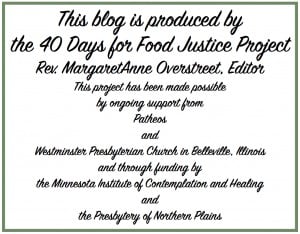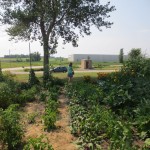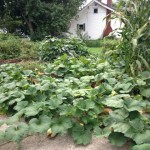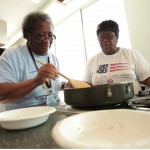Cup by Cup
by Rev. Adam J. Copeland
I’m a coffee addict. Every morning when I wake up, the prospect of my first cup of coffee is my primary concern. While my need for a coffee fix may feel greater than many people’s, I’m certainly not alone in my morning practice. According to a recent USA Today article, 83% of Americans drink coffee. In the U.S. alone, coffee makes up a $30 billion-a-year industry.
I started my habit in early high school and haven’t looked back. I’m guessing I have drunk more than 20,000 cups in my life (I’m 31). I can only hope to make it to the 100,000 Cup Club. While coffee drinking has long been a beloved avocation, not until recently have I thought more intentionally about where those beans came from, and who grows them.
Through a fortunate work partnership, last summer I visited several coffee farms and coffee growing cooperatives in Nicaragua. Sure, I had seen plenty of coffee farming pictures over the years in coffee shops, but they never made much of an impression on me. In fact, I usually viewed them predominantly as a marketing gimmick. Look at us, we appreciate the coffee supply chain. Feel good. Buy more.
But something about seeing the coffee plantations struck me deeply. I met farmers who struggled to grow a consistent crop in our changing climate. I met distributors who packed thousands of pounds of beans in ear-splittingly loud factories. I met women who, by hand, plucked irregular beans, one by one, from a conveyer belt. I met cooperative members who banded together to negotiate higher prices for their product so that their families might be fed.
But that was last summer. Now it’s Lent and my memories of Nicaragua are fading. I have long since used up all the coffee beans from the cooperatives I visited. In the weeks following my return, I would take my morning cup (or three) and think of Nicaragua. But that reminiscing, too, is fading away. When I buy coffee now, I try to look for a Fair Trade label but, to be honest, I admit I look first for sale stickers.
Has my experience in a coffee growing region of the world, in one of the poorest countries in the Western hemisphere changed anything? When it comes to the question of food justice, was my (extremely privileged) visit with coffee farmers anything more than a progressive’s version of feel good token tourism?
On my better days, that experience meeting Nicaraguan coffee farmers does help me think—and act—more justly, but only in minor way. When I shop at my local farmers’ market and talk to Thor who runs a small organic farm in western Minnesota, I’m building on my experiences in Nicaragua. When I call my elected representatives and advocate for legislation to curb climate change, I do so for many reasons but one of them is a response to my experiences in Nicaragua. When in a coffee shop with pictures of the farmers that source the shop’s beans, now I stop to look more carefully. In short: my actions have changed due to my Nicaraguan experiences, but admittedly, it’s far from drastic.
My experience reflects how awareness building can lead to small, slow changes towards food justice. Is this enough? Is this faithful? The activist in me yearns for more, but the realist admits I have embraced a more minimalist path.
This summer, I’m traveling back to Nicaragua, this time leading a group of college students. We will spend time learning about several farming cooperatives and enjoy a home stay on a small coffee farm. When I return, I anticipate my bags will be full of several more pounds of local Nicaragua coffee beans. And, for several weeks, my morning cup will take on a special blend of reminiscence.
I hope this global experience continues to deepen my local practices. Maybe I’ll show some pictures of the Nicaraguan farm to Thor. Maybe I’ll add a specific story to my calls to my elective representatives. Slowly, I hope to move towards justice. I’m grateful for the activists out there, but for me, at least, work towards food justice is a gradual, day-by-day process. One cup at a time.
———————
Adam J. Copeland teaches in the religion department at Concordia College in Moorhead, Minnesota where he serves as Faculty Director for Faith and Leadership. He blogs at A Wee Blether and tweets @ajc123.
———————————-
Lenten Calendar for MARCH 18
Read Psalm 104. Look online or in books to find mealtime prayers that express your feelings about food.
————————————
Sign up to receive the daily meditations by email, or like us on Facebook.
We need your stories!
We’re already looking ahead to the 40 Days for Food Justice Project for 2016 and we’re looking for more stories, experiences, prayers and resources about food justice and food injustice.
If you would like to contribute – or would like to recommend a contributor – please send us an email and let us know.
About:
In addition to being the founder and editor-in-chief of the “40 Days for Food Justice Project”, the Rev. MargaretAnne Overstreet is a mom, a Presbyterian pastor, and a certified Health Coach. She does ministry with and among the good people of Westminster Presbyterian Church in Belleville, Illinois, where she gets her hands dirty in the community garden and, every Sunday, preaches with bare feet. She treasures family time, relishes every opportunity to teach and write about food justice, and loves to play outside with her dogs. Find out more about her at www.AnInBetweenPlace.com













